|
|
|
Sort Order |
|
|
|
Items / Page
|
|
|
|
|
|
|
| Srl | Item |
| 1 |
ID:
087888
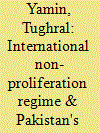

|
|
|
| 2 |
ID:
130865
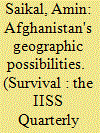

|
|
|
|
|
| Publication |
2014.
|
| Summary/Abstract |
Afghanistan's geostrategic potential is hampered by domestic weakness, regional tensions and major-power competition. Historically, Afghanistan's position at the junction between Asia and Europe has not only made it susceptible to outside invasions and influence, but also rendered it an important conduit for cross-continental interactions. The Greco-Bactrian (250-150 BCE), Kushan (30-375 AD) and Sassanid (224-651 AD) empires derived much of their wealth from the Silk Road, a series of interlinked trading networks criss-crossing the Eurasian land mass and centred around what is now known as Afghanistan. These routes served as the main arteries of east-west trade and transportation, until the disintegration of the Mongol Empire in 1368 AD effectively dismantled the network.
|
|
|
|
|
|
|
|
|
|
|
|
|
|
|
|
| 3 |
ID:
132946
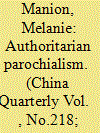

|
|
|
|
|
| Publication |
2014.
|
| Summary/Abstract |
This article draws on evidence from loosely structured interviews and data from original surveys of 5,130 delegates in township, county and municipal congresses to argue that congressional representation unfolds as authoritarian parochialism in China. It makes three new arguments. First, popularly elected local congresses that once only mechanically stood in for the Chinese mass public, through demographically descriptive and politically symbolic representation, now work as substantively representative institutions. Chinese local congressmen and women view themselves and act as "delegates," not Burkean trustees or Leninist party agents. Second, this congressional representation is not commonly expressed in the quintessentially legislative activities familiar in other regime types. Rather, it is an extra-legislative variant of pork-barrel politics: parochial activity by delegates to deliver targeted public goods to the geographic constituency. Third, this authoritarian parochialism is due to institutional arrangements and regime priorities, some common to single-party dictatorships and some distinct to Chinese authoritarianism.
|
|
|
|
|
|
|
|
|
|
|
|
|
|
|
|
| 4 |
ID:
130443
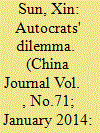

|
|
|
|
|
| Publication |
2014.
|
| Summary/Abstract |
How do authoritarian elections affect voters' attitudes toward the regime and their support for democracy? This article draws upon the case of village elections in China to argue that elections may have two simultaneous effects. First, free and fair elections increase citizens' confidence in the government. Second, elections also allow voters to exercise political rights and accumulate democratic experience through participation, and this in turn may trigger greater demand for further empowerment. Empirical analysis of data from a two-round nationwide survey conducted in 114 villages confirms both effects. One implication of these findings is that competitive elections may simultaneously boost regime popularity and increase public demand for further democratic reform.
|
|
|
|
|
|
|
|
|
|
|
|
|
|
|
|
| 5 |
ID:
113812


|
|
|
|
|
| Publication |
2012.
|
| Summary/Abstract |
Over recent decades a judicialization process of international dispute settlement procedures has taken place. Yet, the judicialization of procedures remains meaningless if the procedures are not used and accepted by disputing states in practice. Prominent theoretical approaches point to different conditions under which this is to be expected. Realism emphasizes the international distribution of power, institutionalism stresses the importance of the institutional design of international dispute settlement procedures, and liberalism points to the domestic institutional setting of the participating states. The article confronts these theoretical expectations with states' actual dispute settlement behavior in the international trade regime, the United Nations Security Council, the European human rights regime and the regime on the protection of endangered species in the 1970s/80s and 1990s/2000s, respectively. Its main finding is that, compared to realism and liberalism, institutionalism fares better in explaining the judicialization of states' dispute settlement behavior.
|
|
|
|
|
|
|
|
|
|
|
|
|
|
|
|
| 6 |
ID:
132996
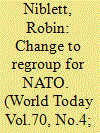

|
|
|
|
|
| Publication |
2014.
|
| Summary/Abstract |
In a world of flashpoints and European defence cuts the alliance needs strengthening, when the British government offered to host the NATO summit in Wales on September,4-5, few foresav that this would be a defining moment in the history of the Atlantic Alliance.
|
|
|
|
|
|
|
|
|
|
|
|
|
|
|
|
| 7 |
ID:
156519
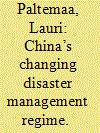

|
|
|
|
|
| Summary/Abstract |
This article analyses China’s disaster management regime at the local level. The article outlines historic disaster management regimes from the pre-imperial era to the present and ends with an analysis of the ongoing campaign for ‘comprehensive disaster relief model communities’. As argued in the article, throughout history Chinese disaster management has been characterized by attempts to combine strong state leadership with active grass-roots participation in disaster prevention and relief work, and different historical circumstances have translated into different kinds of disaster governance regimes with strengths and weaknesses. The current situation is no exception. The current model community drive led by the party-state aims to establish local professional or semi-professional disaster management organizations in every urban community, but leaves the role of civic organizations vaguely defined. While the state’s commitment to local-level disaster management has its strengths, the current ambiguous conceptualization of the role of civil society actors leaves resources untapped.
|
|
|
|
|
|
|
|
|
|
|
|
|
|
|
|
| 8 |
ID:
082389
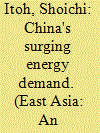

|
|
|
|
|
| Publication |
2008.
|
| Summary/Abstract |
This article revisits a conventional interpretation of Sino-Japanese energy relations from geopolitical and zero-sum viewpoints. Contemporary Sino-Japanese disputes over the East China Sea and their scramble over a crude-oil pipeline from Russia have drawn global attention to the intensification of the rivalry between the two giant energy consumers. Beijing and Tokyo, however, have gradually found common interests resulting from business opportunities, environmental countermeasures, etc. Russia's failure in driving a wedge between China and Japan, and the United States' proactive engagement in Asia-Pacific energy issues, appear to provide new opportunities in which the East Asian powers' energy rivalry can be reduced
|
|
|
|
|
|
|
|
|
|
|
|
|
|
|
|
| 9 |
ID:
076679
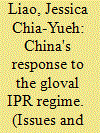

|
|
|
| 10 |
ID:
132953
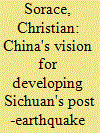

|
|
|
|
|
| Publication |
2014.
|
| Summary/Abstract |
In the aftermath of the 2008 Wenchuan earthquake, government officials, scholars and outside observers eagerly hoped that the emergency relief and reconstruction process would bring about the emergence of civil society and increase grassroots democratic participation. Contrary to this optimistic assessment, this article contends that the local state used the opportunity of the disaster as an experimental laboratory to implement an array of already existing national development plans. The urgency with which the reconstruction was to be completed and the opportunities to meet national development targets as well as access reconstruction funds were too tempting to resist. However, the ham-fisted Leninist implementation style met with local resistance and has contributed to a significant deterioration in local state-society relations. The fact that many local residents continue to question why, despite the huge resources invested by the state in the reconstruction project, they have yet to see any improvement in their economic and overall living conditions points to a deficit of local participation and a breakdown in political communication and trust. By focusing on the different political economies of disaster reconstruction, this article attempts to illuminate the regime's vision for developing the countryside, rural politics, and state-society relations in China more broadly. Unless the state is able to incorporate local needs into its development plans, it will not win the trust and support of local residents, regardless of the amount of money it invests or the benevolence of its intentions.
|
|
|
|
|
|
|
|
|
|
|
|
|
|
|
|
| 11 |
ID:
132892
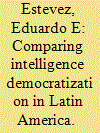

|
|
|
|
|
| Publication |
2014.
|
| Summary/Abstract |
This article aims to contribute to the understanding of the intelligence democratization process in new democracies comparing three South American countries: Ecuador, Peru, and Argentina. With a background of authoritarian legacies ('political police' style intelligence agencies controlled by the military) under particular political circumstances and changing strategic environments, these countries experienced disparate trajectories, prescriptions, and outcomes in their efforts to reform their intelligence communities. Drawing on new institutionalism, historical moments and relevant events shaping the dynamics of intelligence democratization are highlighted for each case, depicting failures and successes, and identifying drivers of change.
|
|
|
|
|
|
|
|
|
|
|
|
|
|
|
|
| 12 |
ID:
133090
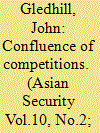

|
|
|
|
|
| Publication |
2014.
|
| Summary/Abstract |
In April 2006, riots broke out on the streets of Dili. As violence escalated over the weeks that followed, a beacon of liberal peace-building dissolved into near-anarchy. While there have been several accounts of Timor-Leste's "crisis" of 2006, it remains unclear why violence spiraled at that time, rather than at an earlier point in the country's post-conflict transition. This article addresses that temporal puzzle by combining an analysis of the structural origins of the crisis with discussion of proximate, agency-driven triggers to violence. The resulting narrative first details the development of competition between governing elites, and also between state security actors, over the years following independence. The fusion of those two dynamics of competition in 2006, I then argue, created conditions sufficient for violent conflict.
|
|
|
|
|
|
|
|
|
|
|
|
|
|
|
|
| 13 |
ID:
124419
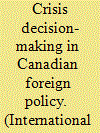

|
|
|
|
|
| Publication |
2013.
|
| Summary/Abstract |
In 1985 the Canadian government closed its embassy in Lebanon and opened a mission in Syria. This realignment occurred amid charges from Lebanon and the Lebanese diaspora in Canada that the government was abandoning Lebanon at the moment of its greatest need and rewarding the malevolent Ba'ath regime in Damascus. The Canadian Department of External Affairs, under the leadership of Secretary of State Joe Clark, risked political fallout from this controversy-such as outrage from Lebanese and Israeli diaspora communities in Canada, injured relations with Israel, Lebanon, and Syria, and partial responsibility for the deteriorating human security situation in Lebanon-in favour of protecting the Canadian embassy staff from escalating violence in Beirut and seizing the opportunity to open a long overdue diplomatic presence in Damascus, Syria, from which the hard-line Ba'ath party dominated much of the region's politics.
|
|
|
|
|
|
|
|
|
|
|
|
|
|
|
|
| 14 |
ID:
130445
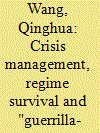

|
|
|
|
|
| Publication |
2014.
|
| Summary/Abstract |
Based on newly available memoirs and previously unexplored policy speeches by insiders, this article conducts a political analysis of the Chinese Communist Party's decision to radically expand college enrollment in June 1999. I argue that the decision exemplifies a "guerrilla-style approach" to policy-making. From late March to early June of 1999 when the radical expansion policy was formulated and legitimated, the top leadership ignored opposition from the Ministry of Education (MOE), overturned established policies and assumed de facto control over MOE bureaucratic power. This abrupt, forceful, disruptive and non-professional policy intervention, which aimed to ensure regime survival in the wake of the Asian financial crisis, was antithetical to regularized educational policy-making in post-Mao China.
|
|
|
|
|
|
|
|
|
|
|
|
|
|
|
|
| 15 |
ID:
125100
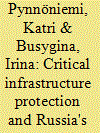

|
|
|
|
|
| Publication |
2013.
|
| Summary/Abstract |
The Russian policy on critical infrastructure protection was outlined in the early 2000s and has been consolidated in recent years as a part of the national security strategy. This policy is evolving against a background composed of an uneasy combination of factors: the degeneration of infrastructures critical for the country's economic and social development, and the de-legitimization of political institutions responsible for protecting 'population' and 'territory'. The recent major catastrophes in Russia, the notorious forest fires in 2010 in particular, have become examples of political events that offer a point of reference for the current regime's failure to uphold its promises of 'order and stability'.
|
|
|
|
|
|
|
|
|
|
|
|
|
|
|
|
| 16 |
ID:
131639
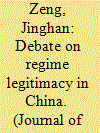

|
|
|
|
|
| Publication |
2014.
|
| Summary/Abstract |
This article identifies continuities, new trends and shifts in emphasis in the Chinese elite debate about political legitimacy by analysing 125 Chinese articles concerning legitimacy published between 2008 and 2012. It reveals a remarkable cleavage between the international perceptions of the Chinese state and the pessimistic views among Chinese intellectuals about the party's ruling. It finds that Chinese scholars often look at Western theories when dealing with the legitimacy conundrum, and rarely look at Chinese philosophy. They focus on ideology much more than Western scholars, and they are more pessimistic about performance legitimacy than the latter. Moreover, this study finds that the legitimacy concerns and policy suggestions of scholars vary significantly depending upon their research locations, institutions and funding sources. This study also finds a distinct rising appeal of social autonomy that runs counter to the dominant official line. Nowadays, value changes, socioeconomic inequality and corruption are considered to be the most perceived threats to legitimacy; ideology, social justice and governance are the leading prescriptions for the party-state. This result is vastly different from the previous study, suggesting a fundamental shift in the legitimacy debate driven by the worsening socioeconomic problems in China.
|
|
|
|
|
|
|
|
|
|
|
|
|
|
|
|
| 17 |
ID:
133033
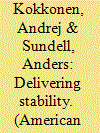

|
|
|
|
|
| Publication |
2014.
|
| Summary/Abstract |
Building a strong autocratic state requires stability in ruler-elite relations. From this perspective the absence of a successor is problematic, as the elite have few incentives to remain loyal if the autocrat cannot reward them for their loyalty after his death. However, an appointed successor has both the capacity and the motive to challenge the autocrat. We argue that a succession based on primogeniture solves the dilemma, by providing the regime with a successor who can afford to wait to inherit the throne peacefully. We test our hypothesis on a dataset covering 961 monarchs ruling 42 European states between 1000 and 1800, and show that fewer monarchs were deposed in states practicing primogeniture than in states practicing alternative succession orders. A similar pattern persists in the world's remaining absolute monarchies. Primogeniture also contributed to building strong states: In 1801 all European monarchies had adopted primogeniture or succumbed to foreign enemies.
|
|
|
|
|
|
|
|
|
|
|
|
|
|
|
|
| 18 |
ID:
084162
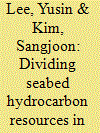

|
|
|
| 19 |
ID:
133255
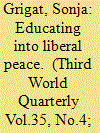

|
|
|
|
|
| Publication |
2014.
|
| Summary/Abstract |
Indonesia has seen excessive political violence in the first years since the end of autocratic rule under former president Suharto. Documented violence has ranged from separatist struggle to communal strife to terrorist attacks. The International Crisis Group (icg) has reported extensively on the conflicts underlying this violence and has formulated policy advice on how to overcome them. While the icg's reports on Indonesia have been acknowledged for their detailed and accurate account of micro-level violence, their recommendations reveal their political objectives. The icg's panacea for overcoming violent conflicts is institution building and security sector reform, which are centrepieces of the 'standard programme' of liberal peace- and state building. However, it is not only its policy advice but all the icg's publications in general that aim to diffuse the liberal governance agenda. This article argues that, through the narrative technique of epideictic oratory, the icg is aiming to educate its audience into a liberal governmentality characterised by practices and procedures which effect a de-politicisation of violence, foster liberal forms of governance and self-government and thus contribute to sustaining liberalism as a global 'regime of power'.
|
|
|
|
|
|
|
|
|
|
|
|
|
|
|
|
| 20 |
ID:
082385
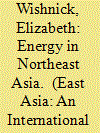

|
|
|
|
|
| Publication |
2008.
|
| Summary/Abstract |
Although Northeast Asia typically is seen as an arena for conflict over energy supplies, complementary economic relationships would seem to make the region ripe for energy cooperation: Russia possesses major oil and gas resources, while China, Japan, South and North Korea all depend on imported energy. The four papers in this issue raise a number of important and, at times, neglected issues about the prospects for energy cooperation in Northeast Asia. While focusing on specific projects for energy supply and conservation, the authors implicitly raise broader theoretical questions about the prospects for and consequences of regional energy cooperation
|
|
|
|
|
|
|
|
|
|
|
|
|
|
|
|
|
|
|
|
|